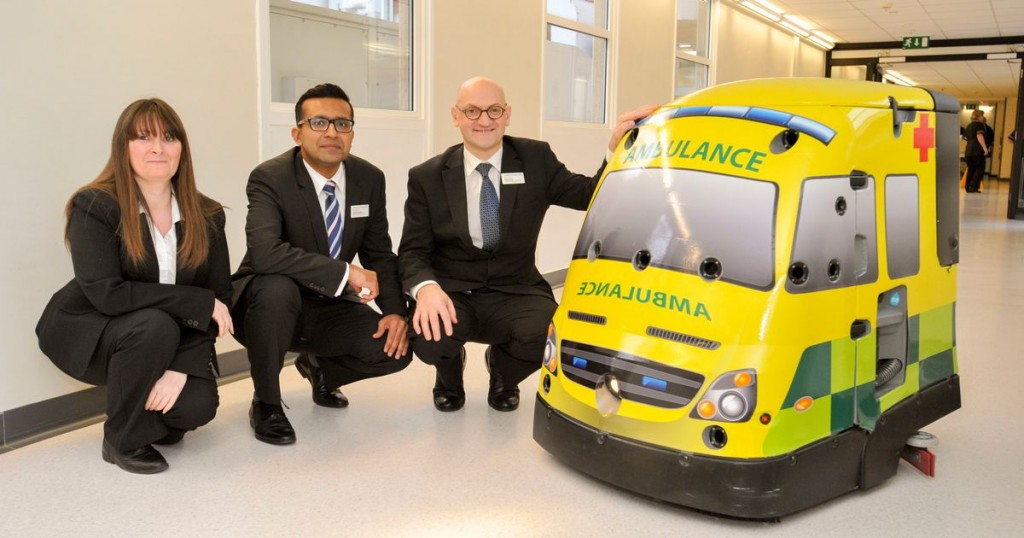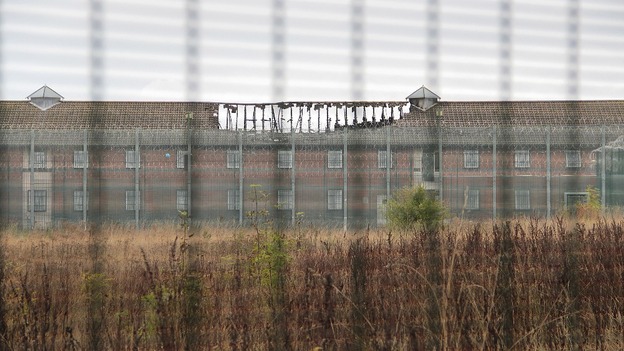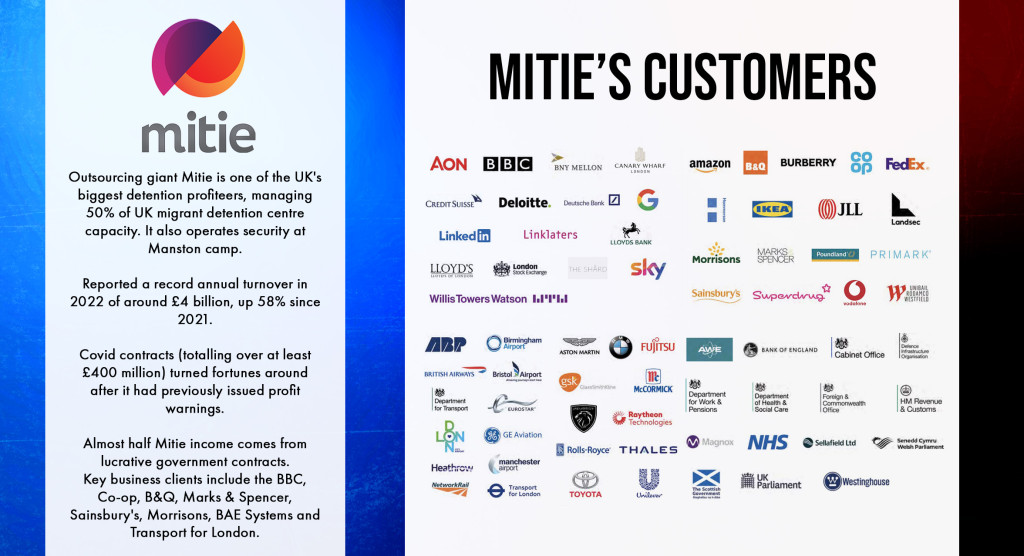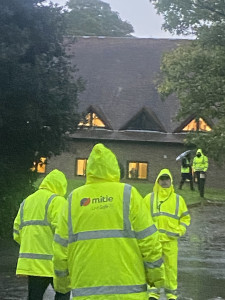Mitie detention profiteers: 2023 company profile

Mitie is a major British outsourcing firm providing a mixed bag of “facilities management” contract services to both corporations and government, from cleaning to custodial services. It has been in the spotlight again recently for supplying security services at the Manston detention camp. This became seriously overcrowded and refugees being kept there complained of appalling conditions.
In this update of our company investigation on Mitie, we found that:
- In the last financial year, it reported a record annual turnover of around £4 billion, up 58% since 2021.
- Mitie runs 50% of the Home Office’s migrant detention facilities. It also supplies the guards that enforce Home Office deportations. Earlier in 2022, Mitie was investigated for “suspected anti-competitive conduct” after winning yet more lucrative detention deals, although this investigation is now closed.
- Mitie’s largest single shareholders, Stephen and Caroline Butt, donated £52,000 to the Conservative Party between 2015 and 2021.
- It has had a track record of paying low wages and attempting to pay workers less than minimum wage, especially when it worked in the business of care homes.
- A huge area of profit growth comes from the chilling push towards increased surveillance technology across many sectors.
Do you have any information you’d like to share about Mitie? Get in touch!
Business basics
In the 2022 financial year, Mitie Group Plc recorded a record annual turnover of around £4 billion, up 58% since 2021. Just over a third (38%) of its sales are to business customers. Mitie’s customer range is vast, ranging from retailers including Co-op, Sainsbury’s, Morrisons and Ikea, to the BBC, major banks, defence companies and a raft of government departments. Profit and shareholder returns have been rising, in part through securing significant government contracts during the pandemic, and also since it bought Interserve for £120 million in 2020. This year has seen the company secure £2.1 billion in new contract wins, more than in the past three years combined.
Mitie employs around 72,000 people. Its head office is in London, with regional offices around the UK. According to the 2022 annual report, it has some small subsidiaries registered in other European countries, in Africa (Nigeria, Kenya, Ghana) and in the United Arab Emirates. However, over 95% of its turnover comes from the UK.
Profit margins differ between Mitie’s business areas but detention is amongst the most lucrative. The company’s services are grouped into several divisions. These are, in order of revenue in the 2022 annual report:
- Business Services (£1.5 billion). This division delivers security, cleaning and office services. It generated £429 million from Covid-related government contracts providing testing centres and security in quarantine hotels. It also began a contract worth over £53 million in September 2022 to provide security services at Home Office ‘contingency accommodation’ centres. It recently launched ‘Mitie Intelligence Services’, which allegedly “integrates intelligence, technology and people”. Key clients for this sector include the BBC, B&Q, Marks & Spencer, BAE Systems and Transport for London. See below for more detail on this sector.
- Central Government and Defence (£669 million). Mitie continues to win lucrative government contracts. This includes maintenance for “1% of the UK land mass” reserved for defence training. Mitie also has a contract with the DWP ‘helping’ people who lost work during the pandemic.
- Communities (£460 million) This division focuses primarily on healthcare, education and is providing an increasing number of outsourcing services to universities.
- Technical Services (£973 million) Working mainly in the private sector, but since the buyout of Interserve this division is now picking up PFI contracts. According to Mitie, this sector provides clients with “solutions to their Green Energy, Decarbonisation, Connected Workspace and Mobile Telecoms challenges”.
- Specialist Services (£373 million). Specialist services’ operating profit is 8.8% – the highest for all divisions. The majority of this comes via Care & Custody providing “public services in immigration, criminal justice and secure healthcare”, revenue for which has increased by 25% to £136 million. The Care & Custody sector has contracts worth nearly £518 million on the order book, up from almost £445 million in 2021.
It’s pretty much certain that most people in the UK will shop at, or use services that help keep Mitie’s profit margins up.
Cashing in on Covid
Mitie cashed in on the pandemic when it was in big financial trouble. But when Covid hit, Mitie’s fortunes turned around. It sucked up lucrative government contracts and managed to halt profit warnings.
Mitie scored several large Covid testing contracts. This included a £32 million deal from the Department for Health and Social Care (DHCS) to set up and operate testing sites in 2020. The government used Article 32 to bypass normal tender processes and justify offering contracts like this directly to Mitie and many other outsourcing giants during the pandemic. In late 2020, Mitie secured another DHCS contract worth £4.6 million to provide mobile testing laboratories – again using Article 32. In 2021 it also went on to share a DHCS contract, with its share worth over £365 million. Research by the Good Law Project raised an alarm over this contract when it found that Mitie was working in partnership with a company called Stronghold Global. Stronghold’s commercial director – Tom Turner – is married to Conservative MP Michelle Donelan, who’s held a string of cabinet positions. Concerns over winning Covid contracts through Tory cronyism seem well-founded as Mitie’s links with other Tory grandees are solid and discussed in more detail below.
Despite these lucrative contracts, workers at a Mitie test centre caught Covid in January 2021, raised the alarm and questioned safety measures. The firm claimed that it followed test and trace guidance and the site was deep cleaned. Meanwhile, Mitie also provided cleaners to hostels for Southwark Council who worked for poverty wages without adequate PPE. And despite raking in millions from Covid-related work, in November 2021 it slashed workers’ guaranteed pay by a third at mobile test and trace units. This came only weeks before the World Health Organisation classified Omicron as a variant of concern.
Even post-pandemic, Mitie’s record 2022 turnover was still boosted by nearly £48 million from ongoing Covid-related deals.
Key Issues
Detention profiteering: “Mitie Care and Custody”
The scale of Mitie’s immigration work makes the company one of the most significant profiteers from the UK border regime. Although it may not like to highlight its detention and deportation work, Mitie has been actively pursuing new contracts in this sector. The new deportation “escorting” contract doubled revenues in the area, and it continues to scoop up new detention centre contracts as they come up for re-tendering. Yet, the company is so vast that this segment still only represents about 3% of Mitie’s total revenue.
Nevertheless, revenue for this work has grown by 25% over the past year due to new or renewed immigration contracts. As of November 2022, Mitie runs the following immigration detention centres:
- Dungavel: a former Scottish prison which was converted into a detention centre in 2001. It has a capacity of 125 people and has been run by Mitie since 2021. According to the company’s latest annual report, the £66m contract runs for 8 years.
- Harmondsworth and Colnbrook: rebranded as ‘Heathrow Immigration Removal Centre’, now a single migrant mega-prison. With a capacity of 965 people, Mitie doesn’t like to call this a prison and instead describes it as the “largest immigration removal centre in Europe”. Its contract, awarded in 2014, has been extended to November 2023. It may extend still further to a maximum of 11 years, for a total of £248.9m.
- Derwentside: Originally known as Hassockfield, Derwentside is an 84-bed women’s holding centre near Newcastle which opened in 2021. Mitie’s £16.6m contract began in June 2021 and lasts until June 2023.
Campsfield detention centre in Oxford, also formerly run by Mitie, closed in 2018. However, the government recently announced its intention to reopen the site in late 2023 at the earliest. Whether Mitie will snap up the contract again remains to be seen.
In May 2018, the company won a £514m “escorting” contract, which runs until 2028. Its job is to supply guards to enforce each deportation from the UK and move migrants between detention centres and prisons. The work also includes the management of short-term holding rooms at ports, airports and immigration reporting centres; as well as contracts at short-term Home Office managed residential holding facilities such as Manston in Kent and Larne House in Northern Ireland.
Mitie also supplies custody officers to a number of police stations in Leicestershire and Northamptonshire, and while it does not currently run any regular prisons, it does provide “facilities management”, such as cleaning and catering. The company says these contracts involve working closely with the Home Office, “to help deal with the challenges in immigration services, including the ramp-up of services to deal with the increasing volume of small boat arrivals on the South Coast.”
As well as profiting from immigration services, the Care and Custody division has been milking the police custody cash cow further. In 2022 alone, it secured one contract of over £57 million for healthcare provision to South West police and another up to £7 million for “healthcare and forensic services within custody” with Derbyshire police.
Mitie, along with Interserve, now has a potential stake in contracts worth £4 billion as part of the Prison Operator Service Framework. As a result, it added ‘justice’ to the Care and Custody package and hopes to secure a share of £2.5 billion “from a buoyant pipeline including prisons management, a key growth market in the Justice sector”.
Technology
Like other outsourcers, Mitie has a double incentive to increase automation of its services: to cut labour costs and to compete with rivals by offering new “high tech” services. And as Mitie’s security contracts increase everywhere – from hospitals to university campuses and from shopping malls to refugee camps – it’s also carving out a chilling name for itself in surveillance technology.
In 2021, it bought Esoteric a “niche provider of leading counter espionage and specialist surveillance countermeasure services”. As a result, Mitie now owns:
The only UK company to be accredited by the National Security Inspectorate for both electronic sweeping and covert investigations… The acquisition builds on Mitie’s existing capabilities as the UK’s leading provider of technology and intelligence-led security services.
Alongside Esoteric, buying up Interserve has enabled Mitie to secure even more ‘intelligence-led’ contracts for Mitie Security, including “AI CCTV and facial recognition”. In 2021, the company also “introduced an industry-first Data-Sharing Agreement” allegedly to allow “retailers to share data on shoplifters, helping to tackle prolific offenders and organised crime groups more effectively”. Mitie’s huge investment in this area of technology alongside its presence in nearly every public space we enter, becomes more concerning by the day.
In June 2022, Big Brother Watch filed a legal complaint with the Information Commissioner after it emerged that 35 Southern Co-ops were using facial recognition in their supermarkets. This “Orwellian in the extreme” technology was provided by “surveillance firm Facewatch”. It is no surprise perhaps that Mitie has previously worked with Facewatch to develop CCTV for security in retail spaces. As a Big Brother Watch report on facial recognition highlights, although increasing surveillance from facial recognition threatens everyone’s civil liberties, it also discriminates against people of colour and women disproportionately. Facial recognition cameras in supermarkets may be just the tip of the iceberg since Mitie’s most recent annual report acknowledges the introduction of “cutting edge technology” – including facial recognition – for “existing and prospective customers”.
Another high-profile development has been the use of cleaning robots. Mitie has publicised the use of these in big contracts including Birmingham Airport, Heathrow Airport and Hinchingbrooke Hospital. It introduced “autonomous scrubber-dryer robots” along with an electronic meal ordering system to the John Radcliffe Hospital in Oxford. Elsewhere, Mitie has a partnership with Microsoft to work on using “Big Data” technologies in its facilities management and property services packages.
In 2019, CEO Phil Bentley acknowledged that the company’s “restructuring” and increased use of IT would “inevitably” impact some jobs. He continued:
That’s the reality. But that’s not the main story.
Does it mean fewer jobs or does it mean we are more productive and win more business? I’d like to think the latter.

“Moptimus Prime” cleaning robot at Hinchingbrooke hospital
In more detail
History
Mitie stands for the truly awful phrase: “Management Incentive Through Investment Equity”. It was started in 1987 in Bristol by two businessmen called David Telling and Ian Stewart. Its original business model was to buy 51% stakes to fund a range of companies, with the rest of the shares owned by the managers. Cleaning and “support services” were a focus, but Mitie has always had a loose range of business interests – basically, anything that looked like it could bring in a few quid.
Mitie’s detention “Care and Custody” business in fact started out as a car park company called Mitie Parking Services. But when a new director called Colin Sobell was appointed in 2009, the subsidiary changed its name and started chasing prison contracts. Sobell had previously run US prison company GEO’s UK operation, and before that worked for the detention company GSL (now part of G4S). Using his expertise and contacts, Mitie took the Campsfield detention contract over from GEO in 2011. Then in 2014, it won the Heathrow detention centres deal from Serco, suddenly becoming the UK’s biggest detention contractor. It’s been increasing and profiting from, detention contracts ever since.
This seemed easy enough in the pre-recession boom years when the rival outsourcing companies were all snapping up government services and busily expanding. Back in 2011, 37% of Mitie’s sales came from the public sector – another 34% from “energy services” sub-contracted from the big energy firms.
The wheels started to come off in 2015. Mitie got seriously stung by its ill-advised investment in the home care ‘market’. Mitie bought the Mihomecare business, previously called Enara, for £111 million in 2012, hoping to cash in on the ageing population. But in 2017 it sold it to a private equity buyer for a nominal £2, also handing over £9.45m to cover its losses. The business had depended on effectively paying care workers below the official minimum wage; now not only was the minimum wage rising, but Mitie was forced to actually pay it after workers campaigned and brought lawsuits. Mitie wasn’t able to pass on these rising costs to austerity-hit local authorities. Although the company now likes to emphasise that it has worked with the Living Wage Foundation since 2019, this wasn’t the case at that time.
Mitie people
Bosses
CEO Phil Bentley, a trained accountant from Bradford, was formerly Managing Director of British Gas (2007-13). He became well known to the media for giving frequent interviews where he was attacked for putting up household energy bills. He then left to become CEO of Miami-based telecoms firm Cable and Wireless. Bentley’s base salary is £900,000. But when you count his bonuses and pension allowance, he took home a hefty pay package of £3.8m in 2022. In fact, his profits have continued to rise, in 2021 he earned £2.7m in 2021, up from £2m in 2021 following a £1.1m cash bonus and a £622,000 award from shares. Mitie’s latest annual report reveals that Bentley also owns stock shares valued at £1,800,000. However, a corporate data shows that the market value of his shares is £8.9 million.
Mitie’s links with the Conservative party are well known. Bentley’s predecessor was Tory peer, Baroness (Ruby) McGregor-Smith, CBE, who led the company for 10 years. MacGregor-Smith, an accountant, was recruited as finance director in 2002 and then made CEO in 2007. The first Asian woman to run a FTSE 250 company, she was later made a Conservative Baroness, and nicknamed the “prickly peer” by the Financial Times. Claiming to have a “passion” for outsourcing, she set out to grow the company with acquisitions and new contracts until it could rival the likes of Capita and her old employer Serco. McGregor-Smith was awarded her peerage in 2015 and left Mitie a year later. She now sits on the House of Lords Industry and Regulators Committee and was until recently President of the British Chamber of Commerce and a non-executive board member of the Department for Education.
Philippa Roe – aka Baroness Couttie – was another Tory Peer sitting at the top of the Mitie ladder; she passed away as we were writing this article. A non-executive director, Roe started her career in PR before moving into banking, where she enjoyed directorships at Schroders and Citigroup. From there she found her way into politics, serving as leader of Westminster City Council for five years as well as sitting on the London Crime Reduction Board. Both Roe and McGregor-Smith had unsuccessfully nominated themselves Tory candidates in the London mayoral elections.
Simon Venn is the company’s Chief Government & Strategy Officer and therefore presumably responsible for maintaining good relations with the state. Venn was described in a (now edited) page on Mitie’s website as “a senior advisor to the UK government”, who “was appointed in 2010 by the then Foreign Secretary, Sir William Hague MP, to sit on the Foreign & Commonwealth Office’s Overseas Business Risk (OBR) board”. Despite these apparently prominent roles, there is little publicly-available information on him. Like Bentley, he too served on the upper echelons of Cable & Wireless before that company got sold off.
Danny Spencer, has sat at the head of Mitie’s “Care and Custody” division for the past seven years. He is a former governor at HMP/YOI Littlehey in Cambridgeshire, and ex-Deputy Governor at HMP Liverpool.
Although the company looks set to achieve the dubious ‘Amazon of FM’ accolade, Mitie would likely prefer not to be reminded about Alloni’s tenure. He left Mitie with immediate effect in April 2022 following a “confidential plea bargain with the U.S. Department of Justice”. Although the investigation is ongoing, it relates to a leak of confidential documents alleging that between 2011 to 2019, telecoms giant Ericsson continued and extended its work in Iraq by paying bribes to the Islamic State and engaged in widespread corruption in ten countries. After the International Consortium of Investigative Journalists (ICIJ) shared the leaked documents, Ericsson acknowledged “‘corruption-related misconduct’ in Iraq and possible payments to Isis”. Alloni was president of Ericsson’s North Africa division from 2010 and then a chief operating officer in charge of “all Ericsson’s operations in [the] Middle East” until 2013.
Shareholders
Corporate databases show that (at the time of writing), Mitie’s largest single shareholder is Silchester International Investors LLP owning 12.8%. The Silchester investment group, an international equity fund based in Mayfair, is ultimately controlled and owned by Stephen and Caroline Butt. Silchester International Investors LLP, dubbed the “quiet investors” has a diverse investment profile which, until recently, included Morrisons supermarket. In 2021, as the largest shareholder, 17 Silchester partners cashed in almost £111 million in dividends after the supermarket’s record sales during Covid-19.
According to its 2022 accounts, Silchester Partners Ltd reported a 16.7% jump in profits and a turnover of £128.6 million. That year alone the Butt couple were paid a dividend of at least £69 million from the Silchester group. It’s no surprise that Stephen Butt – a former Morgan Stanley director – is now one of the UK’s richest fund managers according to The Sunday Times. Dabbling in philanthropy, the Butts are very giving: together donating a total of £52,000 to the Conservative Party between 2015 and 2021, with Caroline Butt alone donating £32,000. The rest of Silchester is owned by British and international backers, and the fund is known for making long-term investments in companies.
Next up is major global institutional investor Fidelity, which owns 10.7% of shares via Fidelity International Ltd and another 5.3% through FMR. Headquartered in Bermuda, a corporate paradise with no corporate tax, Fidelity is no doubt maxing out on its dividends from Mitie’s shady dealings. Ultimately run and owned by Abigail Johnson, the granddaughter of Fidelity’s founder, Johnson has a net worth of around $20 billion (£17 billion) and is listed by Forbes as the 72nd richest person in the world.
Like other PLCs, Mitie is mainly owned by international institutional investment funds. In 2018, when this profile was first published, shareholders were jumping ship as Mitie was in financial trouble. Around this time Fidelity reduced its stake from 9% in 2017. But Silchester was busy adding to its shares, spotting a lucrative opportunity – and it was proved right. At the time, Silchester already had a bigger stake than is usual for a single shareholder to have in outsourcing companies like Mitie.
In 2022, Mitie shared its record turnover with shareholders. Despite a dividend break in 2021, in the tax year ending in March 2022, shareholders secured dividend payments of £5.7 million. Meanwhile, Mitie’s directors discussed a further £19.5 million dividend payment in their AGM in June to keep shareholders sweet. The next company target is a 30-40% dividend payout for shareholders, up from 20% in 2022.
Finances
Outlook and strategies
Mitie currently earns nearly half its turnover through lucrative government contracts. These now total over £2.3 billion compared with over £1.7 billion from non-government contracts.
After its home care losses (see below), Mitie shifted its focus towards “core” Facilities Management (FM) business. Its model aimed to try and get companies to buy an “integrated” package of more services, and for longer contract periods.
So now, rather than just outsourcing particular jobs like cleaning, maintenance or security, Mitie advises companies on how it can take over running all their FM needs. It also brought in “new technology and analytics”. The acquisition of Interserve in 2020 means Mitie is now one of the UK’s largest FM companies, since it retained 90% of the former Interserve contracts. In 2019, Carlo Alloni – ex-managing director of Mitie’s Technical Services division – openly stated Mitie’s intention to become the “Amazon of FM”. (See below for more detail on Alloni.)
In the latest annual report, Mitie boldly declared that since 2021, its new strategy is “focused on accelerating growth, enhancing margin and improving cash generation, underpinned by ‘capability enablers’”. What this actually means is huge executive bonuses and benefit packages alongside rising dividend payouts for shareholders.
For Mitie, climate catastrophe, ongoing wars and the spiralling cost of living crisis simply open new paths to profit. The Mitie leadership team openly admits that the government’s “decarbonisation agenda” and increased defence spending offer “good momentum” to “accelerate growth”. And, as the most recent financial accounts note:
Following the significant rise in gas and electricity costs, Technical Services is benefitting from increased activity in all areas of decarbonisation, including solar power, LED roll-outs, air source heat pump installation and electric vehicle charging projects.
Profit and growth:
Business is now booming. In 2022, Mitie’s record revenue of £4 billion created an operating profit of £167 million and a free cash flow of £133 million.
But prior to the pandemic, the company was on shaky ground. Until 2015, Mitie grew steadily, and in the previous five years made a constant overall operating profit margin of around 6%. Then trouble hit, and the company issued four profit warnings between March 2015 and January 2018. Although it reported profits in 2015/6, revenues were starting to fall, and it reported a loss in 2016/7. The company’s turnover shrunk from £2.4 billion in 2015 to £2.1 billion in 2017. Meanwhile, 2017/8 results showed that although turnover increased slightly to £2.2 billion, helped by new contracts, they actually made an overall loss in their accounts.
The profits warnings Mitie issued to the stock market identified two main problems. Like other outsourcers, Mitie’s business model was based on (i) winning a continuing flow of contracts, and (ii) fulfilling them cheaply by paying a pittance to precarious workers. But Brexit threatened both sides of this strategy. Business customers started cutting or postponing orders in fear of a Brexit slowdown, yet Mitie still had to pay those workers more thanks to the rising minimum wage. In its 2017 Annual Report, Mitie called the rising minimum wage in particular a “structural headwind for the entire UK [facilities management] industry”.
Mitie hoped new higher-margin contracts would start flowing again. And thanks – largely to a global pandemic – they did. In fact in 2022, the company describes having secured a “record £2.1bn of new contract wins”. The purchase of Interserve was money well spent because it enabled Mitie’s tendrils to creep ever further into new profitable – and dystopian – areas of growth. And, although Brexit has proved an economic disaster for countless small and medium-sized businesses, the outsourcing giants haven’t looked back. Selling technology that replaces people while also spying on us, locking people up, and cashing in on a world collapsing in seemingly unstoppable climate, war, refugee and cost of living crises guarantee big profits and shareholder payouts.
A number of official investigations were launched into aspects of Mitie’s previous financial reporting. Mitie’s 2017 accounts had to recalculate the figures it originally gave for 2016, recording its revenues and profits as lower. In 2016, the Financial Conduct Authority (FCA) investigated the timing of Mitie’s profit warning announcements. Another watchdog, the Financial Reporting Committee (FRC), opened an investigation into the “preparation and approval of the financial statements” for 2016 (now closed), and another into the auditing of Mitie’s 2015 and 2016 accounts by Deloitte.
Mitie Scandal Sheet
Mitie is not as high profile as its notorious rivals G4S and Serco. Most of its work has been in less controversial cleaning and maintenance, or for corporate clients. Though, this looks set to change as it pursues more profitable opportunities in detention and security.
(2022) Manston migrant camp hit the headlines after refugees – including children – were held for long periods in “terrible” and severely overcrowded conditions. Human rights campaigners and lawyers have now called for a public inquiry into the site following allegations from refugees about “systemic” abuse, violence and ill-treatment from staff. Complaints also flag “significant failures of planning and management” at the Home Office site.
(2022) The Competition and Markets Authority (CMA) launched an investigation into Mitie for “suspected anticompetitive conduct” following the award of yet more lucrative immigration detention deals. In December 2022, the CMA “provisionally” closed this investigation.
(2022) Allegations that Mitie Care and Custody staff sent racist messages in a WhatsApp group chat led to a Home Office investigation. Comments reportedly targeted Syrian refugees, Chinese people, Dianne Abbot and Priti Patel.
(2021) The company made millions from Covid-19 contracts. At its Inverness testing site, a “catalogue of failures” by the company contributed to staff falling ill.
(2017) Financial investigations: The Financial Conduct Authority (FCA) investigated the timing of Mitie’s profit warning announcements in 2016. Another watchdog, the Financial Reporting Committee (FRC), opened an investigation into the “preparation and approval of the financial statements” for 2016, and another into the auditing of Mitie’s 2015 and 2016 accounts by Deloitte.
(2017) Mitie exits home care: Mitie eventually sold its MiHomecare business at a loss – after paying £112 million for it in 2012. One reason for losses was that it had finally been forced to pay staff the minimum wage.
(2015) MiHomecare scandal: Mitie’s home care business was hit with investigations and lawsuits after failing to pay carers the minimum wage and cutting short care visits. At least four local authority customers had raised concerns about care standards, while the Care Quality Commission (CQC) had rated at least one Mihomecare as “inadequate”.
(2015) Hospital failing standards: within months of winning a cleaning and catering contract for Royal Cornwall Hospitals, Mitie’s pay was docked for repeatedly failing to meet standards.
(2015) Harmondsworth conditions exposed: secret filming inside the Mitie-run detention centre, as part of an investigation by Corporate Watch, showed the misery inside after Mitie took over, cut services and increased bang-up hours under its new contract.
(2011) Campsfield: hunger strikes, suicide, and fire. There are plenty of horror stories from Mitie’s management of the Oxfordshire detention centre; we told some in this 2014 report.

Campsfield after the 2013 fire
Company addresses:
HQ and general enquiries: The Shard, Level 12, 32 London Bridge Street, Southwark, London, SE1 9SG
Tel: 0330 678 0710 Email: info@mitie.com
Regional offices:
1st Floor, The Chocolate Factory, Somerdale, Keynsham, BS31 2GJ
35 Duchess Road, Rutherglen, Glasgow, G73 1AU
650 Pavilion Drive, Northampton Business Park, Brackmills, Northampton, NN4 7SL
NB: unless other sources are stated, information comes from the company’s annual reports and accounts. The latest information can be found here on its website.
This article was updated on 18 January 2023 to address concerns flagged by Mitie’s PR department and to reflect the fact that Mitie is responsible for the management of security at Manston detention camp, not the whole site.
See also: 2015 profile from The Bristol Cable



 Mitie security guards at Manston
Mitie security guards at Manston